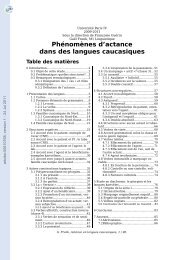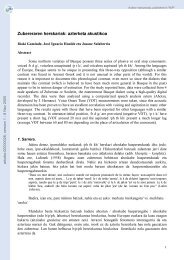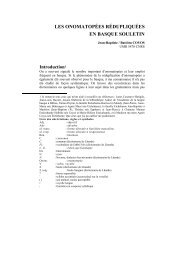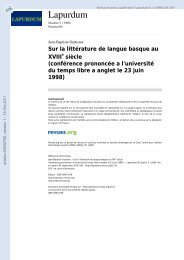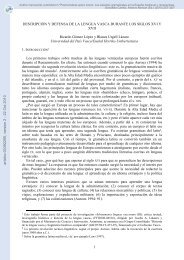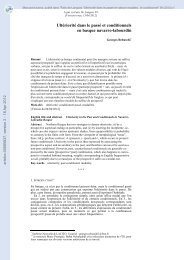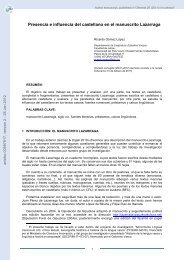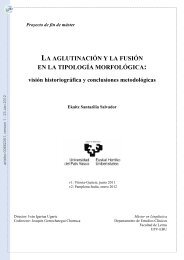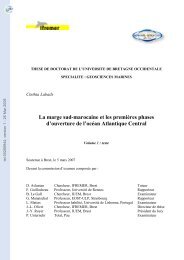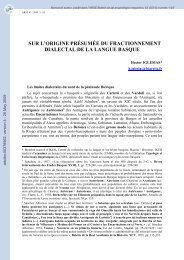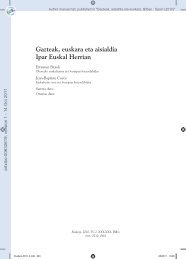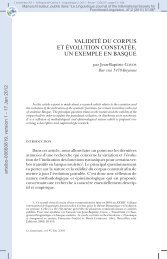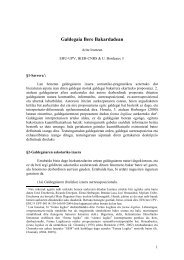On the polysemy of the suffike-ke in the history of Northern Basque
On the polysemy of the suffike-ke in the history of Northern Basque
On the polysemy of the suffike-ke in the history of Northern Basque
You also want an ePaper? Increase the reach of your titles
YUMPU automatically turns print PDFs into web optimized ePapers that Google loves.
artxibo-00494270, version 1 - 22 Jun 2010<br />
478 GEORGES REBUSCHI<br />
b Hnd (1740: Lap.) - 6: juramentu eg<strong>in</strong> zuen … denborarik ez zela izanen gehiago,<br />
7: baiñan … tronpeta jonen zu<strong>ke</strong>nean… 50<br />
But <strong>in</strong> <strong>the</strong> overwhelm<strong>in</strong>g majority <strong>of</strong> <strong>the</strong> cases, <strong>the</strong>re is, as far as I can see, absolutely<br />
no possible semantic difference between such forms and <strong>the</strong> unmar<strong>ke</strong>d analytic<br />
future. 51<br />
11. O<strong>the</strong>r uses <strong>of</strong> -<strong>ke</strong> with non-aoristic verb forms<br />
F<strong>in</strong>ally, <strong>the</strong>re rema<strong>in</strong> quite a few (pragmatic) uses <strong>of</strong> -<strong>ke</strong>, both <strong>in</strong> <strong>the</strong> syn<strong>the</strong>tic<br />
and <strong>the</strong> analytic conjugations, which can best be def<strong>in</strong>ed as convey<strong>in</strong>g <strong>the</strong> spea<strong>ke</strong>r’s<br />
strong commitment to <strong>the</strong> content <strong>of</strong> his speech. Here are three examples, <strong>the</strong> first<br />
two with a izan ‘be’ syn<strong>the</strong>tically conjugated, and <strong>the</strong> third with -<strong>ke</strong> suffixed to an<br />
auxiliary. 52<br />
(27) Mt 13,19<br />
LV - Omnis, qui audit verbum regni et non <strong>in</strong>tellegit, venit Malus et rapit,<br />
quod sem<strong>in</strong>atum est <strong>in</strong> corde eius; hic est, qui secus viam sem<strong>in</strong>atus est.<br />
CDR - When any one heareth <strong>the</strong> word <strong>of</strong> <strong>the</strong> k<strong>in</strong>gdom, and understandeth it<br />
not, <strong>the</strong>re cometh <strong>the</strong> wic<strong>ke</strong>d one, and catcheth away that which was sown <strong>in</strong><br />
his heart: this is he that received <strong>the</strong> seed by <strong>the</strong> way side.<br />
Hnd (1740: Lap.) - Nork ere aditzen baidu Erresumako hitza eta ez baidu hartzen<br />
ungi, heldu da izpiritu gaixtoa eta arrapatzen du haren bihotzean ere<strong>in</strong> izan<br />
dena; hura dite<strong>ke</strong> bidearen basterrean ere<strong>in</strong> izan dena.<br />
(28) Etcheberry (1875, p. 263: Lap.) - ‘Jauna, ze<strong>in</strong> da beraz salduko zaituena?’<br />
Jesusek ihardetsi zuen: ‘Hura dita<strong>ke</strong> nik ogia bustirik emanen diodana.’<br />
Lit., “‘Lord, which is, <strong>the</strong>n, <strong>the</strong> one who will betray you?’ Jesus replied: ‘It is/<br />
will be <strong>the</strong> one to whom I shall give <strong>the</strong> moistened bread.’ 53<br />
50 Cœpere «beg<strong>in</strong>» is left untranslated, but this does not affect <strong>the</strong> po<strong>in</strong>t under discussion.<br />
51 A century later, such vacuous double futures were still to be found:<br />
(i) Mt 6,6<br />
LV Tu autem cum orabis, <strong>in</strong>tra <strong>in</strong> cubiculum tuum… / CDR - But thou when thou shalt pray,<br />
enter …<br />
Hrt (1855: Lap.) - zure othoitza eg<strong>in</strong>en du<strong>ke</strong>zunean…<br />
52 In <strong>the</strong> follow<strong>in</strong>g translations (with °edun used as a lexical verb), it is difficult to know whe<strong>the</strong>r<br />
-<strong>ke</strong>- marks a situation-<strong>in</strong>duced future, or <strong>the</strong> spea<strong>ke</strong>r’s strong commitment:<br />
(i) Jn 12,48<br />
LV - non accipit verba mea, habet qui iudicet eum / KJV & CDR - He that … receiveth not<br />
my words, hath one that judgeth him.<br />
a Hnd (1740: Lap.) - ene hitzak errezibitzen ez dituenak, badu<strong>ke</strong> bere jujea.<br />
b Hrt (1855: Lap.) - ene hitzak onhesten eztituenak, badu<strong>ke</strong> juierik asko.<br />
c Urr (1873: Zub.) - ene elhiak s<strong>in</strong>hesten eztütianak, badü<strong>ke</strong> nurk jüja.<br />
53 A passage <strong>in</strong>spired by Jn 13,26. Even Haraneder used <strong>the</strong> present tense here-but he did use a<br />
double future <strong>in</strong> <strong>the</strong> (semi-)free relative clause: Haiña da nik ogia bustirik emanen dio<strong>ke</strong>dana.<br />
0 ASJU Oyharcabal.<strong>in</strong>dd 478 21/07/09 12:54



